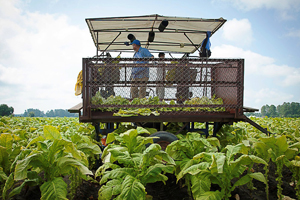The organizers of the 2018 CORESTA Congress have issued a reminder about the deadline for the submission of papers.
The Congress, whose theme is Science and Innovation: Addressing the needs, will be hosted by the China National Tobacco Corporation (CNTC).
It is due to be held on 22-26 October at the Intercontinental Hotel, Kunming, China.
The CORESTA Secretariat said that the call for papers, for which the deadline is May 16, had been published on the CORESTA website.
Direct access to the abstract submission system was available through the CORESTA website.
The announcement said authors would receive immediate receipt messages by email to confirm the successful submission of their abstracts and would be informed of the CORESTA Reading Committee’s selection towards the end of June.
Tag: China

CORESTA-papers deadline

Stirring the pot
China is suffering a rapidly-increasing incidence of lung cancer among non-tobacco-smoking women, according to a story on Ecns.cn edited by Mo Hong’e.
The story cited a report by the China Cancer Center as saying these lung cancer cases were the result of non-tobacco-smoking women being exposed to second-hand-tobacco smoke and cooking-oil fumes.
The report, which compiled data from China’s 31 provinces, municipalities and autonomous regions, suggested that lung cancer was the most frequently occurring malignancy in the country.
Meanwhile, Liang Chaoyang, vice director of the Department of Thoracic Surgery at Beijing’s China Japan Friendship Hospital, said cooking methods, second- or third-hand smoke and environmental pollution were behind the rise of lung cancer among women.
Liang said also that more than 700 million women and children in China had long been exposed to second-hand tobacco smoke both at home and in public spaces, making China the worst place in the world for second-hand tobacco smoke.
About 55 percent of women aged over 15 were exposed to second-hand tobacco smoke at home on a daily basis.
The story said that some cancer experts had claimed that putting someone else in the way of second-hand tobacco smoke was not only selfish and immoral, but also equated to committing slow murder.
Professor Zhi Xiuyi of the Lung Cancer Diagnosis and Treatment Center at the Capital Medical University blamed Chinese cooking methods, such as stir-frying and deep-frying, as a main risk factor in the higher incidence of lung cancer among women.
“They stay in the kitchen for longer periods than men, putting themselves in the path of toxic components, and consequently face a higher risk of lung cancer,” said Zhi
Research led by Zhou Caicun at Shanghai’s Tongji University School of Medicine found cooking oil temperatures directly affected the amounts of fumes created.
Tariff threats ‘troubling’
A trade war between the US and China could have a devastating impact on North Carolina’s tobacco growers, according to a story by Brian Murphy and Zachery Eanes for the News & Observer.
North Carolina exported leaf tobacco worth more than $156 million to China last year, making China the biggest national consumer of the state’s tobacco.
However, the value of North Carolina’s tobacco exports to China was already down – from more than $184 million in 2015 and $166 million in 2016 – when, on Wednesday, China announced plans to impose higher tariffs on more than 100 US products, including tobacco.
Tariffs on unmanufactured tobacco would be raised from 10 percent to 35 percent, while duties on cigarettes and cigars would be pushed up from 25 percent to 50 percent, according the US Department of Agriculture.
The tariffs are only proposals at this time and would not go into effect until at least the middle of May, leaving time for negotiations between the two nations.
Zippy Duvall, president of the American Farm Bureau Federation, urged the nations to negotiate and “produce an agreement that serves the interests of the world’s two largest economies”.
Meanwhile, Larry Wooten, president of the North Carolina Farm Bureau, said the situation was troubling, to say the least, in relation to tobacco. “When you add pork and soybeans, it really hits North Carolina,” he added.
In addition to being the US’ largest producer of tobacco, North Carolina plants 1.6 million acres of soybean.
In total, North Carolina exported $2.3 billion in goods to China in 2016 up from $1.4 billion in 2006, according to the US-China Business Council. China was the state’s third-largest trading partner after Canada ($6.2 billion in goods) and Mexico ($3.1 billion).
The News & Observer story is at: http://www.newsobserver.com/news/politics-government/politics-columns-blogs/under-the-dome/article207952919.html.
Smokers detrained
Passengers in China who are discovered smoking on high-speed trains or in smoke-free zones of other trains will be prevented from train travel for 180 days, according to a story in The China Daily citing a newly-released document and a Guangzhou Daily report.
The document was issued jointly by the National Development and Reform Commission, the Supreme People’s Court and other government departments.
‘Troublemakers, producers and sellers of counterfeit tickets, and those endangering railway transport safety, will also be prevented from taking trains for 180 days,’ the China Daily story said.
‘A roster of those banned from taking trains will be publicized on 12306.cn, a ticket booking website, and creditchina.gov.cn, a credit check website, for seven consecutive days from the first day of each month. Those listed can appeal during that period.’
The rules are due to come into effect on May 1.
Last week, Reuters reported that China had said it would begin applying its ‘social credit’ system to trains and flights, under which people who had committed misdeeds would be barred from taking such transport for up to a year.
A story by Paul Huang for The Epoch Times, meanwhile, described the ‘social credit’ system as an experiment that international observers had speculated would be the next step in China’s transformation into a total surveillance state.
Smoking or non-smoking?
People in China found to be smoking tobacco in places where such activity is prohibited could find themselves subjected to travel restrictions, according to a Reuters report citing rules due to come into effect on May 1.
China has reportedly said it will begin applying its social credit system to flights and trains, under which people who have committed misdeeds would be barred from taking such transport for up to a year.
A story by Paul Huang for The Epoch Times, meanwhile, described the social credit system as an experiment that international observers had speculated would be the next step in China’s transformation into a total surveillance state.
Citing two statements issued on the National Development and Reform Commission’s website on Friday, Reuters said the people who would be put on the restricted lists included those found to have committed acts such spreading false information about terrorism and causing trouble on flights, as well as those who used expired tickets or smoked on trains.
Those found to have committed financial wrongdoings, such as employers who failed to pay social insurance or people who had failed to pay fines, would also face these restrictions, said the statements, which were dated March 2.
The Reuters report is at: https://www.reuters.com/article/us-china-credit/china-to-bar-people-with-bad-social-credit-from-planes-trains-idUSKCN1GS10S.
The Epoch Times report is at: https://www.theepochtimes.com/chinas-orwellian-social-credit-system-to-begin-banning-people-from-planes-trains_2468296.html.
CORESTA calls for papers
The organizers of the 2018 CORESTA Congress yesterday called for papers.
The Congress, whose theme is Science and Innovation: Addressing the needs, will be hosted by the China National Tobacco Corporation (CNTC).
It is due to be held on 22-26 October at the Intercontinental Hotel, Kunming, China.
In a joint announcement, the CNTC Congress Organizing Committee and the CORESTA Secretariat said that the call for papers was now online.
The organizers said the call for papers was currently accessible through the CORESTA website at www.coresta.org and would be made available later through the official Congress website.
Direct access to the abstract submission system was available through the CORESTA website at: CORESTA 2018 abstract submission
The announcement said authors would receive immediate receipt messages by email to confirm the successful submission of their abstracts and would be informed of the CORESTA Reading Committee’s selection towards the end of June 2018.
The deadline for the submission of abstracts is May 16.
An unusual case
A court in China’s Henan Province on Tuesday overruled an appeal filed by the family of a smoker who died of a heart attack after an argument with a man who had asked him to stop smoking in a lift, according to a Xinhua Newswire story.
The Intermediate People’s Court of Zhengzhou found that the behavior of the defendant Yang Jun was lawful and was aimed at safeguarding the public interest.
The court overruled earlier findings, rejected the plaintiff’s compensation claim, and asked the plaintiff to pay litigation costs of more than 14,000 yuan (about US$2,180).
The family of the elderly smoker had claimed more than 400,000 yuan from Yang following the incident in May, alleging that the argument had played a role in triggering the heart attack.
In September, the People’s Court of Jinshui District ruled that Yang’s behavior had not led to the death of the smoker but ordered Yang to pay compensation of 15,000 yuan to the family.
The family appealed against the court’s decision to the Intermediate People’s Court of Zhengzhou City. The court heard the appeal in November but pronounced the final judgement on Tuesday.
The Xinhua Newswire story said the case had attracted nationwide attention with many people criticizing the initial ruling against Yang and welcoming the final judgement.
Although there is no national law on indoor smoking in China, a 2011 regulation banned smoking in indoor public spaces including lifts.
But as of 2016, 18 cities, including Beijing, Shanghai and Shenzhen, had imposed smoking bans.
“Everyone, smoker or non-smoker, has the right to ask smokers to stop smoking in public venues,” said Jiang Yuan, an officer with the Tobacco Control Office, which operates under the Chinese Center For Disease Control and Prevention.
“The final ruling is support for national tobacco control and for those who get up the courage to say no to second-hand smoke.”
Fewer smokers in Beijing
There were 3.99 million smokers in Beijing at the end of 2017, 200,000 fewer than there were before the city’s smoking ban came into force eighteen months earlier, according to a Xinhua News Agency story quoting the Municipal Health and Family Planning Commission.
However, the story did not say whether the fall in the incidence of smoking had been caused by the smoking ban; or by other factors, such as price increases.
Beijing implemented what has been described as the ‘strictest smoking ban in history’ on June 1, 2015, prohibiting smoking in indoor public places and workplaces, and on public transportation.
At the same time, medical institutes in Beijing offered smoking cessation services to more than 7.4 million people, while 61 hospitals in the city opened smoking cessation clinics.
In 2017, 95 percent of inspected public places were found to be operating in accordance with the no-smoking regulation, up from 77 percent in the middle of 2015.
Medical institutions, schools and hotels had the best implementation records. Internet cafes and KTVs [karaoke bars] tended to violate the regulation most frequently.
“We will intensify supervision in 2018 and continue to conduct undercover and targeted inspections,” said the Commission’s Liu Zejun. “We also encourage the public to report to us if they see any violation.”
More than 14,800 volunteers were said to have given 77,000 hours of their time to assist in dealing with 4,547 smoking-related complaints in Beijing during 2017.
Keep digging
China has become the fastest-growing tobacco market, according to a story in the Worker’s Daily citing a report by Zheng Rong, a professor at the University of International Business and Economics.
This is despite the recent imposition of anti-tobacco measures, including cigarette-tax rises.
China has imposed too strict bans on tobacco smoking in more than 20 cities, though the campaign has covered less than 10 percent of the whole country.
Cigarette taxes were raised substantially in 2008 and 2015 but they did not cool demand.
Taxes now account for about 59 percent of the retail prices of cigarettes in China, but they lag behind the global average of 75 percent.
In additional, the disposable income of Chinese smokers was said to have grown by about 85 percent from 2001 to 2016, and even to have doubled among consumers of low-price products.
The incidence of smoking in China among low-income groups is higher than the incidence among high-income groups, and rural residents smoke more than do urban people.
Hu Angang, a professor with Tsinghua University, was quoted as saying that ‘the higher incidence of smoking in poverty-stricken areas and poor families is the main cause of poverty reoccurrence due to the treatment of tobacco-related diseases’.
The global experience indicated that raising taxes on tobacco could effectively reduce the use of tobacco and cut public health expenditures, Zheng said; and he called for higher cigarette prices to reduce smoking among low-income smokers.
Meanwhile, Jiang Yuan, deputy director of the Chinese Center for Disease Control and Prevention’s Tobacco Control Office, said raising the tax and price of tobacco products was one way to control smoking.
Puffing along in China
In China, a passenger is suing a local railway authority for allowing passengers to smoke on trains, according to a story in the China Daily.
The Beijing Railway Transport Court held a hearing on Wednesday in respect of a case brought by a female passenger surnamed Li against the Harbin Railway Bureau (HRB).
While traveling on June 9 from Beijing to Tianjin on train K1301 operated by HRB Li noticed ‘lots of passengers’ smoking between two carriages, though the company’s ‘safety tips’ state that smoking is banned everywhere on the train.
After filing a series of complaints that generated no useful response, Li decided to sue, demanding compensation for her ticket, valued at 102.5 yuan ($13), her legal expenses, and 1 yuan as compensation for her mental suffering.
She demanded also that the HRB issue a smoking ban on train K1301, which is not a high-speed train, and on the platforms at Beijing and Tianjin stations, and the removal of smoking areas and ashtrays.
In court, the defendant argued that the case was a dispute of transportation contract in name only and was essentially a public interest lawsuit. It demanded the court dismiss Li’s request since her claim did not meet the conditions in either case.
HRB said it believed it had fulfilled its contract obligations as the passenger was transported to her destination safely. Setting up smoking areas and ashtrays was a humane management measure rather than a violation of law.
“The complete ban of smoking on regular trains that often take 30 hours to finish a journey is unrealistic,” according to an HRB agent. “Otherwise some people would smoke in the carriages, which is much more dangerous.”









